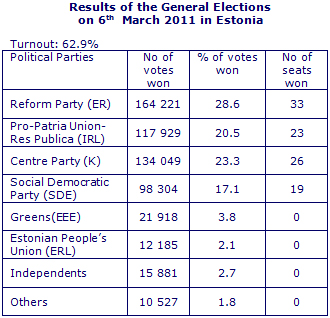News
Corinne Deloy,
Fondation Robert Schuman,
Helen Levy
-

Available versions :
EN

Corinne Deloy
Fondation Robert Schuman
Helen Levy
As forecast by all of the polls the Reform Party led by Prime Minister Andrus Ansip easily won the general elections on 6th March in Estonia. It won 28.6% of the vote, taking 33 seats (+2 in comparison with the previous election on 4th March 2007). It drew ahead of its government coalition ally, Pro-Patria Union-Res Publica (IRL) led by Mart Laar, which won 20.5% of the vote and 23 seats (+4). Together the two outgoing government parties won 56 seats i.e. the absolute majority in the Riigikogu (Parliament).
The Centre Party (K) is still the main opposition party with 23.3% of the vote and 26 seats (-3). The Social Democratic Party (SDE) led by Sven Mikser won 17.1% of the vote and 19 seats (+ 9).
The new parliament will comprise four parties. The Greens of Estonia (EEE) with 3.8% and the Estonian People's Union (ERL) with 2.1% failed to win the vital 5% to be able to have seats in parliament.
Turnout rose to 62.9% +1 in comparison with the general election of 4th March 2007.
140 846 voters i.e. 24.5% of the electorate (+110 121 than four years ago), chose to fulfil their civic duty via the internet. On-line voting was allowed from 24th February to 2nd March. 2,300 Estonians living abroad also voted. The highest number of voters were recorded at the Consulate of Toronto Canada (371) and at the Embassy of Helsinki (346).
"I thank all of those who voted for the Reform Party. We won the number of seats we hoped for," declared the Prime minister. "My priority is to continue work with our present partner, Pro-Patria Union-Res Publica," he indicated "Given the confidence voters have expressed in us the present outgoing coalition seems to be the most likely government," declared IRL's leader, Mart Laar.
Andrus Ansip, who has been at the head of government since April 2005, therefore secured an easy victory. In response to the international economic crisis he undertook a major austerity plan (decrease in civil servants' salaries and an increase in taxes) which enabled Estonia – extremely affected by the shock of the crisis – not to go under completely. Whilst the country experienced a recession of 14% in 2009 it recorded growth of 6.4% at the end of 2010. In 2011 Tallinn is due to witness an increase of 4.2% in its GDP i.e. the highest rate in the EU. The Estonian public deficit lay at 1.6% of the GDP i.e. below the 3% advised by the Stability and Growth Pact and its debt level is by far the lowest in the 27 (9.5% for 86.5% on average in the EU). The government committed to reaching budgetary balance by 2014. The only downside to this success: the unemployment rate totals 10.4% of the working population.
Andrus Ansip can also be proud of having enabled his country to join the Organisation for Economic Cooperation and Development on 9th December last and above all of having integrated the European Economic Monetary Union on 1st January 2011 as Estonia adopted the euro. The Prime Minister has promised to decrease taxes and to invest more in education.
Andrus Ansip, 54 years old, comes from Tartu, the country's second biggest town. He studied chemistry, then agronomy and started his career at the University of Tartu. After the country recovered its independence in 1991 he undertook several activities, notably in the banking sector. He was elected Mayor of Tartu in 1998 under the banner of the Reform Party – he was then appointed Economic Affairs and Communications Minister in 2004. In the same year he took over as head of the party after Siim Kallas's departure for Brussels, after the latter was appointed European Commissioner. In April 2005 Andrus Ansip succeeded Juhan Parts (IRL) as head of government. In March 2007 he won the general elections making the Reform Party the main political party and became the first head of government to be re-elected to his post. On 6th March 2011 Andrus Ansip won the election in a landslide victory again and is due to spend another four years at the Stenbok House, the residence of the Estonian Prime Ministers.
5 months after their Latvian neighbours who on 2nd October re-elected outgoing Prime Minister Valdis Dombrovskis (New Era JL), as head of the country, the Estonians also chose to continue as before by placing the two parties in the outgoing government coalition as head of the country. "Recovery is here and Estonians are convinced that growth will be maintained if they continue with the same policy," analyses the director of the European Centre for International Economic Policy, Fredrik Erixon.
The election results reveal a consolidation of the Estonian political arena. This might lead to changes in the leftwing opposition, notably within the Centre Party. Finally the general election is a positive sign for the President of the Republic Toomas Hendrik Ilves, supported by the Reform Party, since he will be standing for re-election in the presidential election that will take place in the summer.
 Source : Internet Site of the Estonian Electoral Commission
Source : Internet Site of the Estonian Electoral Commission
On the same theme
To go further
Elections in Europe
Corinne Deloy
—
15 April 2025
Elections in Europe
Corinne Deloy
—
25 February 2025
Elections in Europe
Corinne Deloy
—
18 February 2025
Elections in Europe
Corinne Deloy
—
28 January 2025

The Letter
Schuman
European news of the week
Unique in its genre, with its 200,000 subscribers and its editions in 6 languages (French, English, German, Spanish, Polish and Ukrainian), it has brought to you, for 15 years, a summary of European news, more needed now than ever
Versions :



